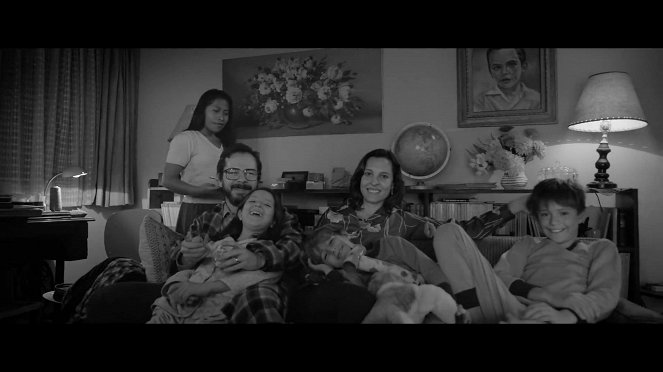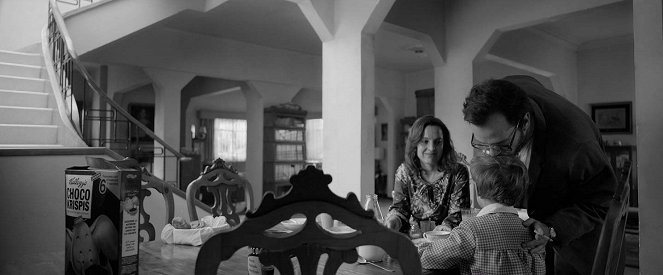Directed by:
Alfonso CuarónScreenplay:
Alfonso CuarónCinematography:
Alfonso CuarónCast:
Yalitza Aparicio, Marina de Tavira, Diego Cortina Autrey, Carlos Peralta, Marco Graf, Daniela Demesa, Nancy García García, Verónica García, Andy Cortés (more)VOD (1)
Plots(1)
With his eighth and most personal film, Alfonso Cuarón recreated the early-1970s Mexico City of his childhood, narrating a tumultuous period in the life of a middle-class family through the experiences of Cleo (Yalitza Aparicio, in a revelatory screen debut), the indigenous domestic worker who keeps the household running. Charged with the care of four small children abandoned by their father, Cleo tends to the family even as her own life is shaken by personal and political upheavals. Written, directed, shot, and coedited by Cuarón, Roma is a labor of love with few parallels in the history of cinema, deploying monumental black-and-white cinematography, an immersive soundtrack, and a mixture of professional and nonprofessional performances to shape its author’s memories into a world of enveloping texture, and to pay tribute to the woman who nurtured him. (Criterion)
(more)Videos (1)
Reviews (13)
The best works of the Czechoslovak new wave (although Fellini would know one in that) has just grown to include a related Mexican cousin, who in the circles of “more demanding" viewers can perhaps not even evoke many captivating Mexican waves. Which is so telling that I will forgive the originally intended hymns for every single aspect, from non-actors through filming and sounding to the sophistication of the narrative, which completely fulfills the saying “the devil is hidden in the details". What Cuarón, as a screenwriter / cinematographer / director, can “as if inadvertently" do in mise-en-scène (or purely noise outside the picture) in mere hints, is more than admirable. To make matters worse, despite the seemingly primordial coldness, this “celebration of ordinary strong women in our lives" is also captivating and arousing emotions like a few movies in recent years. Roma looks like a film that was five decades earlier. However, thanks to its qualities, it would not be forgotten, even if it was actually created fifty years ago. On the contrary, it would be lovingly remembered in the intentions “such master pieces are unfortunately no longer filmed today". Thanks to Cuarón, however, this is not the case; and for that one must be infinitely grateful, whether ultimately Roma is his cup of coffee or not.
()
The surreal power of this film, I think, stems from three things. The first is actually a very ordinary story of a completely awkward main protagonist, which is almost documentary-authentic, personal and 100% impressive thanks to the ordinariness and the awkwardness. The second thing is, without exaggeration, the masterful direction of Alfonso Cuarón. That really needs to be seen. You could create the perfect art photograph from perhaps every shot, it's all thought out to the smallest detail and the black and white camera with the hearty help of sound (something we can't see at all, just we hear it) makes it a feast for the eyes (for example the monumental forest fire scene). The third thing is how the story and presentation “work together" - everything is natural, long camera rides or still shots do not distract from what's happening right now, the scenes beautifully complement each other, form a single whole, etc. I was originally expecting something from Roma in the style of Tornatore’s Malena. It's a completely different film though, completely great in a different way. And the scenes in the maternity ward or on the beach... You simply do not forget them.
()
A normal viewer who seeks spectacle and entertainment while watching movies will most likely be unimpressed by Roma. However, I think that for festivalgoers and a club audience, the film will represent the embodiment of what an artistic film should be. It was filmed in a similar manner as in the 60s and 70s when authorial and autobiographical works were in their prime and enlightened producers invested in them without hesitation. It was a time when directors commonly cast non-actors, and Cuarón does the same here. He is not afraid of improvisation, and the same goes for the Mexican directorial star. Roma feels genuine and authentic. Granted, I am not an expert, but the atmosphere of Mexico City in the early 70s seems perfect to me, as well as the casting. Cuarón must have paid maximum attention to the casting, and Yalitza Aparicio does not play the role of a servant, she simply is one. Devoted, resigned to her position, slightly naive, intoxicated by her first sexual adventure, and confused by the subsequent indifference. Her presence and precise camera work are the director's greatest weapons. The black and white visuals refer to the era of European art film of the 50s and 60s. In many shots, it felt as if I was watching a documentary from that time in the Mexican capital. Thanks to the monumental visual compositions, Roma should be seen on a big screen, which I managed to do after a long search. I would even dare to say that it loses a significant amount of impact on a small screen. It is a slowly flowing intimate film that, although not feminist in nature, mostly depicts the world and emotions of women. Overall impression: 85%.
()
A film with the very distinctive signature of its creator, Roma tells a story about the fragile aspects of life more through its visual art than through the faces and dialogue of its characters. Though it does work with dialogue and facial expressions (and Yalitza Aparicio is great), it does not offer the audience a universally appealing, traditionally emotional message (the film doesn’t even have any “viewer-manipulating” original music). After using his extraordinary filmmaking talent for the commercial blockbuster Gravity, Cuarón wanted to enjoy some pure filmmaking pleasure, without any obligations to studio investments. Roma is a brilliant piece of art in which I admired every shot (three or four scenes were quite disturbing to me) and perceived and acknowledged all of the social references (class-based society, the extraordinary strength of a woman with a difficult fate), but it did not engage me emotionally as much as Gravity or Children of Men.
()
Netflix once again proves that it doesn’t limit itself to commercially successful titles, but is also happy to fulfil the dreams of directors who deserve it. There is no doubt that Alfonso Cuarón is one of the greatest directors of the decade. As many people have mentioned already, Roma is his most personal project, which means that those 135 minutes pass by very slowly and quietly, and I found some moments slightly boring… but because everything is shot in such a brilliant way, referring to the best filmmakers of the last century, this film shouldn’t be ignored.
()



Ads